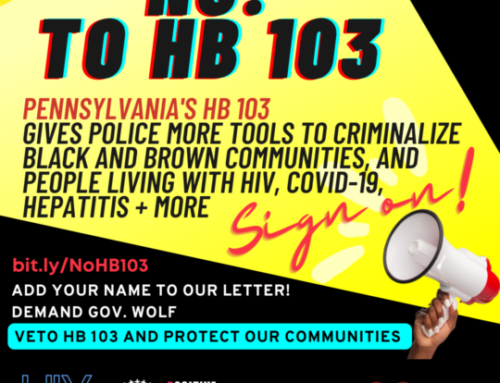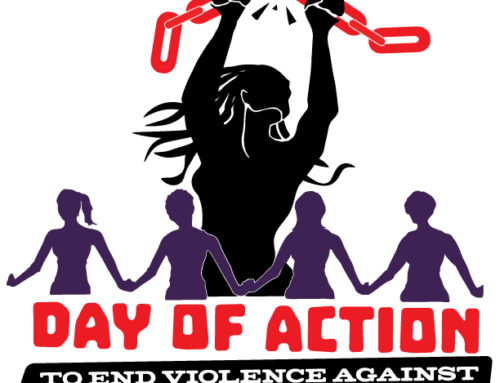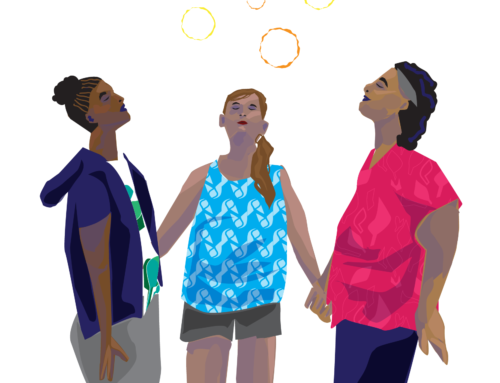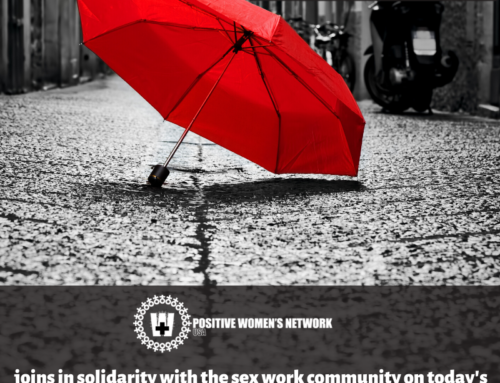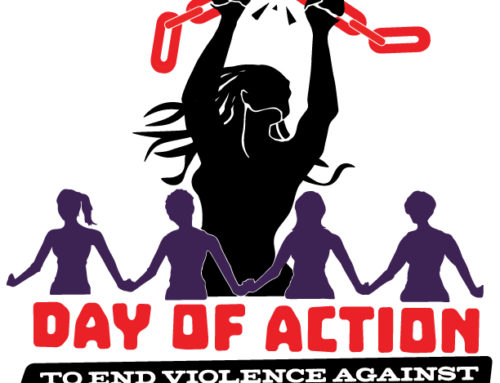 By Loren Jones
The murder of Cicely Bolden on September 6th, 2012, both heightened and inflamed our sense of sadness and rage. It also reminded us of the often daily losing battle of violence that many in this country are silently entrenched in. This silence leaves them less able to believe that the end of the HIV epidemic includes them.
About 50% of women who experience intimate partner violence live in households with children under the age of twelve. It happens in same –sex relationships at the same rate as opposite sex relationships. Most homicides and suicides occur when a partner tries to leave. Intimate partner violence includes physical, emotional, financial, spiritual, and psychological violations. Thus, it is of utmost importance for all service providers, decision makers, social service agencies, and community members to be involved in the fight against violence against women.
As advocates we will keep advocating for more shelter, safe houses, better education and economic pathways to self-determination for all people. Recognizing and ending violence against women is also a major factor in bringing an end to the HIV epidemic for us all. With brighter outcomes and futures for all.
Over the years, commissions charged with addressing violence against women have been set up at various levels of government, including the UN Commission on the Status of Women in 1946. The UN Commission evaluated the progress on gender equality and set global standards and policies to promote gender equality and the advancement of women worldwide.
This year the UN proclamation will hopefully be expanded to include language to eliminate all discrimination and violence against women that hinders their access to HIV prevention and treatment as well as reproductive choices by their intimate partners.
As we all know the road to political, structural, and institutional change is an exercise in persistence and patience. So the question becomes: What can we as individuals – as advocates and allies—do in our daily lives to push this effort forward?
I would like to suggest that we create relationships and collaborations with our local Human Rights Commissions and Commissions on the Status of Women. We must build these connections to tackle community-wide challenges, especially violence against women. We must go to their events and their meetings. Then we must invite those members to come to our meetings and our forums. This will foster dialogue between us and hopefully identify similarities in each of our goals.
I would like to suggest that we reach into our tested and tried “each one teach one” practices and define who and what we are up against. That we plan and organize to make sure that concrete resources and services are available for women when they need it the most. That we heal ourselves and each other. And that we move forward to improve the quality and length of our lives.
Loren Jones is a PWN-USA Founding Member. She is a local and national advocate for HIV, housing, and violence issues. Loren is based in Oakland, CA.
By Loren Jones
The murder of Cicely Bolden on September 6th, 2012, both heightened and inflamed our sense of sadness and rage. It also reminded us of the often daily losing battle of violence that many in this country are silently entrenched in. This silence leaves them less able to believe that the end of the HIV epidemic includes them.
About 50% of women who experience intimate partner violence live in households with children under the age of twelve. It happens in same –sex relationships at the same rate as opposite sex relationships. Most homicides and suicides occur when a partner tries to leave. Intimate partner violence includes physical, emotional, financial, spiritual, and psychological violations. Thus, it is of utmost importance for all service providers, decision makers, social service agencies, and community members to be involved in the fight against violence against women.
As advocates we will keep advocating for more shelter, safe houses, better education and economic pathways to self-determination for all people. Recognizing and ending violence against women is also a major factor in bringing an end to the HIV epidemic for us all. With brighter outcomes and futures for all.
Over the years, commissions charged with addressing violence against women have been set up at various levels of government, including the UN Commission on the Status of Women in 1946. The UN Commission evaluated the progress on gender equality and set global standards and policies to promote gender equality and the advancement of women worldwide.
This year the UN proclamation will hopefully be expanded to include language to eliminate all discrimination and violence against women that hinders their access to HIV prevention and treatment as well as reproductive choices by their intimate partners.
As we all know the road to political, structural, and institutional change is an exercise in persistence and patience. So the question becomes: What can we as individuals – as advocates and allies—do in our daily lives to push this effort forward?
I would like to suggest that we create relationships and collaborations with our local Human Rights Commissions and Commissions on the Status of Women. We must build these connections to tackle community-wide challenges, especially violence against women. We must go to their events and their meetings. Then we must invite those members to come to our meetings and our forums. This will foster dialogue between us and hopefully identify similarities in each of our goals.
I would like to suggest that we reach into our tested and tried “each one teach one” practices and define who and what we are up against. That we plan and organize to make sure that concrete resources and services are available for women when they need it the most. That we heal ourselves and each other. And that we move forward to improve the quality and length of our lives.
Loren Jones is a PWN-USA Founding Member. She is a local and national advocate for HIV, housing, and violence issues. Loren is based in Oakland, CA.
Continued Reflections on Women, HIV, and Violence: Involving Local, State, and Global Commissions
by Loren Jones
 By Loren Jones
The murder of Cicely Bolden on September 6th, 2012, both heightened and inflamed our sense of sadness and rage. It also reminded us of the often daily losing battle of violence that many in this country are silently entrenched in. This silence leaves them less able to believe that the end of the HIV epidemic includes them.
About 50% of women who experience intimate partner violence live in households with children under the age of twelve. It happens in same –sex relationships at the same rate as opposite sex relationships. Most homicides and suicides occur when a partner tries to leave. Intimate partner violence includes physical, emotional, financial, spiritual, and psychological violations. Thus, it is of utmost importance for all service providers, decision makers, social service agencies, and community members to be involved in the fight against violence against women.
As advocates we will keep advocating for more shelter, safe houses, better education and economic pathways to self-determination for all people. Recognizing and ending violence against women is also a major factor in bringing an end to the HIV epidemic for us all. With brighter outcomes and futures for all.
Over the years, commissions charged with addressing violence against women have been set up at various levels of government, including the UN Commission on the Status of Women in 1946. The UN Commission evaluated the progress on gender equality and set global standards and policies to promote gender equality and the advancement of women worldwide.
This year the UN proclamation will hopefully be expanded to include language to eliminate all discrimination and violence against women that hinders their access to HIV prevention and treatment as well as reproductive choices by their intimate partners.
As we all know the road to political, structural, and institutional change is an exercise in persistence and patience. So the question becomes: What can we as individuals – as advocates and allies—do in our daily lives to push this effort forward?
I would like to suggest that we create relationships and collaborations with our local Human Rights Commissions and Commissions on the Status of Women. We must build these connections to tackle community-wide challenges, especially violence against women. We must go to their events and their meetings. Then we must invite those members to come to our meetings and our forums. This will foster dialogue between us and hopefully identify similarities in each of our goals.
I would like to suggest that we reach into our tested and tried “each one teach one” practices and define who and what we are up against. That we plan and organize to make sure that concrete resources and services are available for women when they need it the most. That we heal ourselves and each other. And that we move forward to improve the quality and length of our lives.
Loren Jones is a PWN-USA Founding Member. She is a local and national advocate for HIV, housing, and violence issues. Loren is based in Oakland, CA.
By Loren Jones
The murder of Cicely Bolden on September 6th, 2012, both heightened and inflamed our sense of sadness and rage. It also reminded us of the often daily losing battle of violence that many in this country are silently entrenched in. This silence leaves them less able to believe that the end of the HIV epidemic includes them.
About 50% of women who experience intimate partner violence live in households with children under the age of twelve. It happens in same –sex relationships at the same rate as opposite sex relationships. Most homicides and suicides occur when a partner tries to leave. Intimate partner violence includes physical, emotional, financial, spiritual, and psychological violations. Thus, it is of utmost importance for all service providers, decision makers, social service agencies, and community members to be involved in the fight against violence against women.
As advocates we will keep advocating for more shelter, safe houses, better education and economic pathways to self-determination for all people. Recognizing and ending violence against women is also a major factor in bringing an end to the HIV epidemic for us all. With brighter outcomes and futures for all.
Over the years, commissions charged with addressing violence against women have been set up at various levels of government, including the UN Commission on the Status of Women in 1946. The UN Commission evaluated the progress on gender equality and set global standards and policies to promote gender equality and the advancement of women worldwide.
This year the UN proclamation will hopefully be expanded to include language to eliminate all discrimination and violence against women that hinders their access to HIV prevention and treatment as well as reproductive choices by their intimate partners.
As we all know the road to political, structural, and institutional change is an exercise in persistence and patience. So the question becomes: What can we as individuals – as advocates and allies—do in our daily lives to push this effort forward?
I would like to suggest that we create relationships and collaborations with our local Human Rights Commissions and Commissions on the Status of Women. We must build these connections to tackle community-wide challenges, especially violence against women. We must go to their events and their meetings. Then we must invite those members to come to our meetings and our forums. This will foster dialogue between us and hopefully identify similarities in each of our goals.
I would like to suggest that we reach into our tested and tried “each one teach one” practices and define who and what we are up against. That we plan and organize to make sure that concrete resources and services are available for women when they need it the most. That we heal ourselves and each other. And that we move forward to improve the quality and length of our lives.
Loren Jones is a PWN-USA Founding Member. She is a local and national advocate for HIV, housing, and violence issues. Loren is based in Oakland, CA.
 By Loren Jones
The murder of Cicely Bolden on September 6th, 2012, both heightened and inflamed our sense of sadness and rage. It also reminded us of the often daily losing battle of violence that many in this country are silently entrenched in. This silence leaves them less able to believe that the end of the HIV epidemic includes them.
About 50% of women who experience intimate partner violence live in households with children under the age of twelve. It happens in same –sex relationships at the same rate as opposite sex relationships. Most homicides and suicides occur when a partner tries to leave. Intimate partner violence includes physical, emotional, financial, spiritual, and psychological violations. Thus, it is of utmost importance for all service providers, decision makers, social service agencies, and community members to be involved in the fight against violence against women.
As advocates we will keep advocating for more shelter, safe houses, better education and economic pathways to self-determination for all people. Recognizing and ending violence against women is also a major factor in bringing an end to the HIV epidemic for us all. With brighter outcomes and futures for all.
Over the years, commissions charged with addressing violence against women have been set up at various levels of government, including the UN Commission on the Status of Women in 1946. The UN Commission evaluated the progress on gender equality and set global standards and policies to promote gender equality and the advancement of women worldwide.
This year the UN proclamation will hopefully be expanded to include language to eliminate all discrimination and violence against women that hinders their access to HIV prevention and treatment as well as reproductive choices by their intimate partners.
As we all know the road to political, structural, and institutional change is an exercise in persistence and patience. So the question becomes: What can we as individuals – as advocates and allies—do in our daily lives to push this effort forward?
I would like to suggest that we create relationships and collaborations with our local Human Rights Commissions and Commissions on the Status of Women. We must build these connections to tackle community-wide challenges, especially violence against women. We must go to their events and their meetings. Then we must invite those members to come to our meetings and our forums. This will foster dialogue between us and hopefully identify similarities in each of our goals.
I would like to suggest that we reach into our tested and tried “each one teach one” practices and define who and what we are up against. That we plan and organize to make sure that concrete resources and services are available for women when they need it the most. That we heal ourselves and each other. And that we move forward to improve the quality and length of our lives.
Loren Jones is a PWN-USA Founding Member. She is a local and national advocate for HIV, housing, and violence issues. Loren is based in Oakland, CA.
By Loren Jones
The murder of Cicely Bolden on September 6th, 2012, both heightened and inflamed our sense of sadness and rage. It also reminded us of the often daily losing battle of violence that many in this country are silently entrenched in. This silence leaves them less able to believe that the end of the HIV epidemic includes them.
About 50% of women who experience intimate partner violence live in households with children under the age of twelve. It happens in same –sex relationships at the same rate as opposite sex relationships. Most homicides and suicides occur when a partner tries to leave. Intimate partner violence includes physical, emotional, financial, spiritual, and psychological violations. Thus, it is of utmost importance for all service providers, decision makers, social service agencies, and community members to be involved in the fight against violence against women.
As advocates we will keep advocating for more shelter, safe houses, better education and economic pathways to self-determination for all people. Recognizing and ending violence against women is also a major factor in bringing an end to the HIV epidemic for us all. With brighter outcomes and futures for all.
Over the years, commissions charged with addressing violence against women have been set up at various levels of government, including the UN Commission on the Status of Women in 1946. The UN Commission evaluated the progress on gender equality and set global standards and policies to promote gender equality and the advancement of women worldwide.
This year the UN proclamation will hopefully be expanded to include language to eliminate all discrimination and violence against women that hinders their access to HIV prevention and treatment as well as reproductive choices by their intimate partners.
As we all know the road to political, structural, and institutional change is an exercise in persistence and patience. So the question becomes: What can we as individuals – as advocates and allies—do in our daily lives to push this effort forward?
I would like to suggest that we create relationships and collaborations with our local Human Rights Commissions and Commissions on the Status of Women. We must build these connections to tackle community-wide challenges, especially violence against women. We must go to their events and their meetings. Then we must invite those members to come to our meetings and our forums. This will foster dialogue between us and hopefully identify similarities in each of our goals.
I would like to suggest that we reach into our tested and tried “each one teach one” practices and define who and what we are up against. That we plan and organize to make sure that concrete resources and services are available for women when they need it the most. That we heal ourselves and each other. And that we move forward to improve the quality and length of our lives.
Loren Jones is a PWN-USA Founding Member. She is a local and national advocate for HIV, housing, and violence issues. Loren is based in Oakland, CA.



